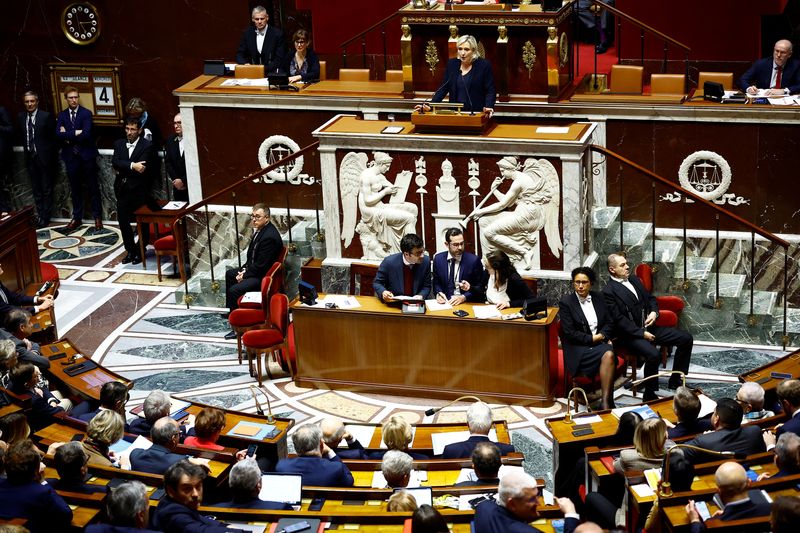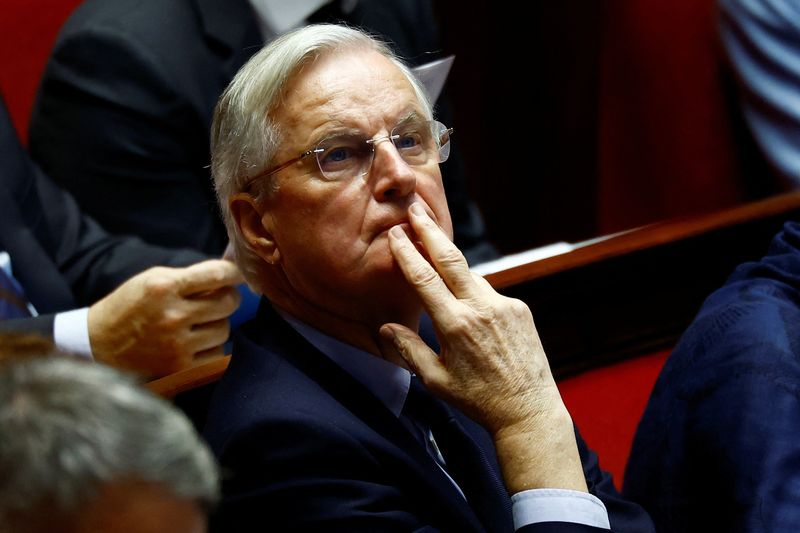By Elizabeth Pineau and Michel Rose
PARIS (Reuters) -French lawmakers passed a no-confidence vote against the government on Wednesday, throwing the European Union's second-biggest economic power deeper into a crisis that threatens its capacity to legislate and tame a massive budget deficit.
Far-right and left-wing lawmakers joined forces to back a no-confidence motion against Prime Minister Michel Barnier, with a majority 331 votes in support of the motion.
Barnier now has to tender his resignation and that of his government to President Emmanuel Macron, making his minority government's three-month tenure the shortest lived in France's Fifth Republic beginning in 1958. He is expected to do so on Thursday morning, French media reported.
The hard left and far right punished Barnier for using special constitutional powers to adopt part of an unpopular budget without a final vote in parliament, where it lacked majority support. The draft budget had sought 60 billion euros ($63.07 billion) in savings in a drive to shrink a gaping deficit.
"This (deficit) reality will not disappear by the magic of a motion of censure," Barnier told lawmakers ahead of the vote, adding the budget deficit would come back to haunt whichever government comes next.
No French government had lost a confidence vote since Georges Pompidou's in 1962. Macron ushered in the crisis by calling a snap election in June that delivered a polarised parliament.
With its president diminished, France now risks ending the year without a stable government or a 2025 budget, although the constitution allows special measures that would avert a U.S.-style government shutdown.
France's political turmoil will further weaken a European Union already reeling from the implosion of Germany's coalition government, and weeks before U.S. President-elect Donald Trump returns to the White House.
The country's outgoing defence minister Sebastien Lecornu warned the turmoil could impact French support for Ukraine.
The hard left France Unbowed (LFI) party demanded Macron's resignation.
Barnier's demise was cheered by far-right chief Marine Le Pen, who has sought for years to portray her National Rally party as a government in waiting.
"I'm not pushing for Macron's resignation," she said. "The pressure on the president will get greater and greater. Only he will make that decision."
NO EASY EXIT FROM FRENCH POLITICAL CRISIS
France now faces a period of deep political uncertainty that is already unnerving investors in French sovereign bonds and stocks. Earlier this week, France's borrowing costs briefly exceeded those of Greece, generally considered far more risky.
Macron must now make a choice. The Elysee Palace said the president would address the nation on Thursday evening.
Three sources told Reuters that Macron aimed to install a new prime minister swiftly, with one saying he wanted to name a premier before a ceremony to reopen the Notre-Dame Cathedral on Saturday, which Trump is due to attend.
Any new prime minister would face the same challenges as Barnier in getting bills, including the 2025 budget, adopted by a divided parliament. There can be no new parliamentary election before July.
Macron could alternatively ask Barnier and his ministers to stay on in a caretaker capacity while he takes time to identify a prime minister able to attract sufficient cross-party support to pass legislation.
A caretaker government could either propose emergency legislation to roll the tax-and-spend provisions in the 2024 budget into next year, or invoke special powers to pass the draft 2025 budget by decree - though jurists say this is a legal grey area and the political cost would be huge.
Macron's opponents also could vote down one prime minister after the next.
ECONOMIC PAIN
The upheaval is not without risk for Le Pen.
Macron allies sought to present her as an agent of chaos after her party joined forces with the left to down Barnier.
"The French will harshly judge the choice you are going to make," Laurent Wauquiez, a lawmaker from the conservative Les Republicains party who backs Macron, told Le Pen in parliament. Since Macron called the summer snap election, France's CAC 40 benchmark stock market index has dropped nearly 10% and is the heaviest loser among top EU economies.
The euro EUR=EBS showed little immediate reaction versus the dollar, trading for around $1.05 per euro, but dipping against other European currencies, such as the Swiss franc and the pound. "I’m amazed the euro hasn’t moved much," said Nick Rees, senior foreign exchange market analyst at Monex Europe. "There are two major powers in Europe, France and Germany, both of which right now are emasculated.”

Barnier's draft budget had sought to cut the fiscal deficit from a projected 6% of national output this year to 5% in 2025. Voting down his government would be catastrophic for state finances, he had said. Le Pen shrugged off the warning. She said her party would support any eventual emergency law that rolls over the 2024 budget's tax-and-spend provisions into next year to ensure there is stopgap financing.
($1 = 0.9513 euro)
